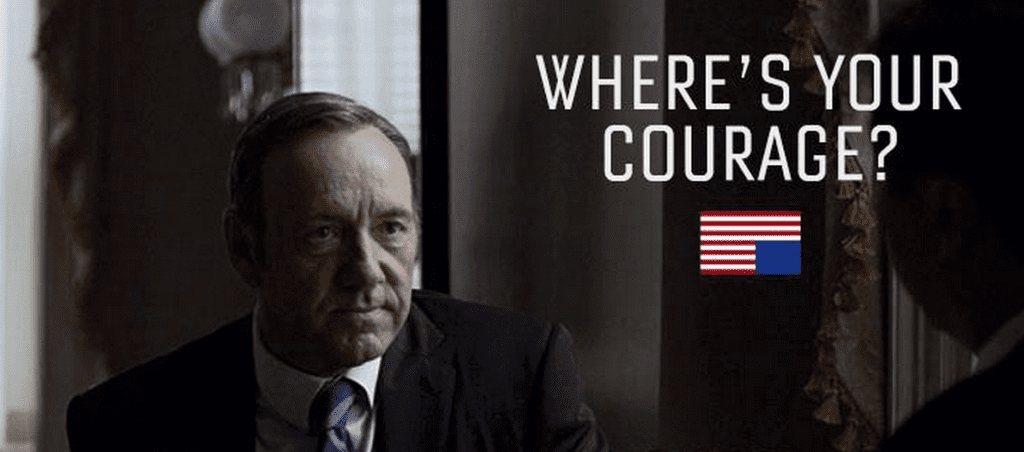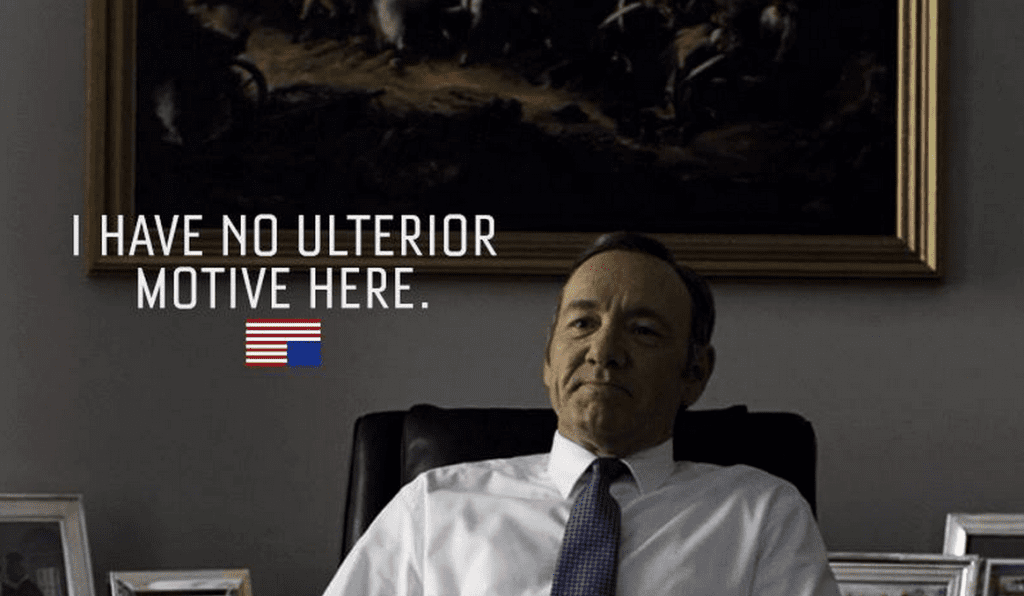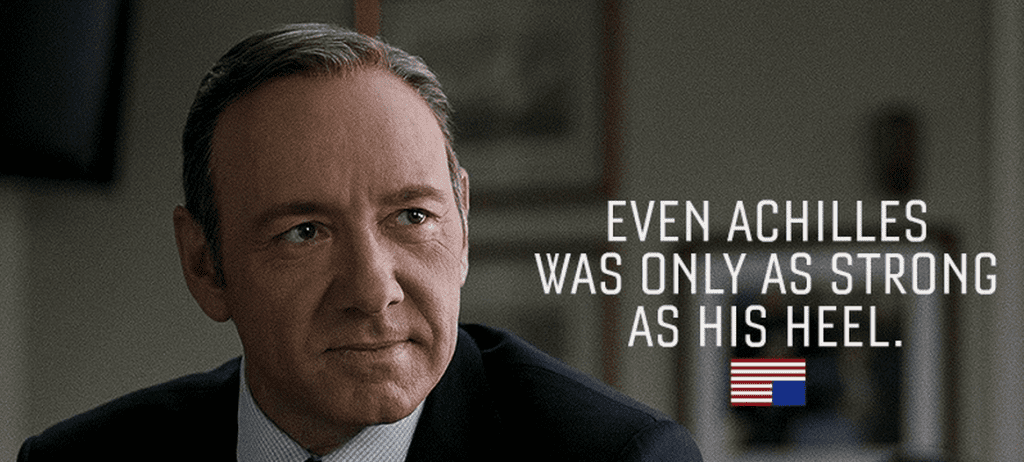Did you know that 87% of people are apprehensive to negotiation? Most people hate it. They despise it. Some people even compare negotiation to the act of going to a dentist.
Negotiation shouldn’t be a dirty word. It’s a fact of life.
Well, it’s a fact of life if you’re not willing to lie down like a doormat and let everyone and anyone walk all over you.
Frank Underwood is the king of negotiation. If you’re unfamiliar with the show; House of Cards – you’re missing out on one of the best TV series since M*A*S*H. It’s the story of a politician who is hungry for power and is willing to do everything and anything to achieve success. For those familiar with the show, I don’t have to explain to you how ruthless and relentless the main character is. And because of that, I hope those who haven’t watched it will simply take my word for it…
[ Click to Tweet (can edit before sending) ]
In every episode, we can find Frank Underwood negotiating a deal with senators, governors, congressmen and even presidents. He does it flawlessly. Without flinching. Without a bead of sweat and without hesitation.
So why are we so apprehensive of negotiation? Well, it tends to be linked to our insecurities and the lies we tell ourselves to get out of the actual act… Things like:
- I’m only 25 years old, I’m pretty young to be making this kind of money. I should probably just be happy with where I am…
- I’ve only worked here for a couple years – I need to pay my dues.
- What if they say no? That will make me look bad.. I’ll have to go get a new job. OMG…What if they fire me for being so entitled?
- The company is in a rough spot. It’s probably not the best time for me to ask for a raise. Maybe I should stay a while until they sort this out…
Sound familiar?
Well, I’m going to tell you right now that most of those excuses are just that. Excuses. So let’s stop making them and let’s start making an impact on the way we negotiate. I’m not just talking about getting a raise at your job either. Negotiation skills can be applied to credit card payments, phone bills, car payments, car insurance, work benefits and even an upgrade to a fancy suite at a nice hotel.
How? It’s as simple as understanding motivations and the strategies that will assist in elevating your perceived value. Let’s look at some of the lessons that Frank Underwood & life can teach us on this exact topic…
Don’t Negotiate Without A Plan of Attack
Unfortunately, I’ve witnessed people begin negotiations without having a plan in place. With no time to actual plan and gather thoughts on what it is you want from a negotiation, it’s likely that you’ll make a decision you will soon regret.
I’ve seen it. I’ve done it. I’ve regretted it.
Go into your negotiations prepared.
Take the time to understand what exactly you’re looking for and listen to their requests. We often think we know what the person across the table wants when we’re really just leap to conclusions based on assumptions. That’s a fast road to failure.
Take the time to actually write out some of the things you want. Some questions that you should know before going into a negotiation:
1. What is a win-win situation for both parties?
2. How much do you want to make? How much do you need to make?
3. What is the market rate for people with your skillset & experience?
4. What measurable results have you been able to bring to the table?
5. What are the key benefits for the other person to agree?
If you’re negotiating a salary, whether that’s an HVAC technician salary, a marketer, or a teacher…this is really just the beginning. You should be armed with information about your benefits, your commute to work, your manager, your colleagues, your office supplies, your company budget, vacation, spousal coverage, etc… You should be armed with this information and also have an understanding of what it is you actually want. All of these items can and should be discussed, negotiated and brought to the table.
Simply bringing these items to the table gives you a leg up in the negotiation. It makes the other person realize how serious you are about your job and it demonstrates an attention to detail. When someone agrees to a contract without careful review, they are often putting themselves in a bad situation. This is why you need time.
And if you’re being pushed to make a decision without having time to actually plan; don’t be afraid to say you need more time. It’s your right to ask for more time to think about the terms of an agreement. In a situation where Frank Underwood was being pushed to make a decision without a lot of time to process the ramifications, he responded perfectly:
“I never make such big decisions so long after sunset and so far from dawn.” – Frank Underwood
That’s the mindset you need to have going into surprise negotiations. I wouldn’t suggest using that exact line but there’s definitely value in creating a rule for why you can’t do something. This simple act makes it feel more like you have an obligation beyond your own control for why you need to hold off on saying yes. As a result, the person doesn’t get defensive and feel as if you’re against them. If it’s a business deal, your approach could be as simple as saying:
“Ok, this sounds pretty good – Let me talk about this with my boss.”
From there, you can come back and let them know that (1) your boss agreed or (2) your boss didn’t agree but you still want to figure out how to make something work. Or if you’re negotiating a better room after getting poor service at a hotel – You could say something like:
“I really think this upgrade would be great but I want to check with my wife/husband to ensure it’s the right fit.”
Again, this approach gives you more time to think but also the ability to stay on the good side of the person you’re negotiating with. At the end of the day, you should never commit to something until you have the time to prepare a decision.
Some people think that asking for more time will set off a red flag. The opposite is true. Someone requiring a quick close and is pushing you to make a decision on the fly – that’s a red flag.
There Is Always A Way To Make Something Work
After being a consultant for the last few years, I’ve quickly learned that there is always a way to make something work. That’s why the first question in the last section was about figuring out what a win-win situation would look like for the two parties.
Let’s say you’re negotiating with a client who wants to work with you on a project but their budget isn’t where it needs to be. You could definitely walk away from the project and cut your losses – but you could also get creative like Frank Underwood with how you approach it.
In situations where a client really wants to work with you; there are always options. One approach could be to stretch the project over a longer period of time so you can still take on other work to fill those gaps while servicing them at a slower rate.
Don’t be afraid to tell the other person that you want to find this win-win situation. It’s often the actual words that people have trouble with in a negotiation so I’m telling you that saying this: “Look, I want this to be a win-win situation for both of us.” is something that works in negotiations.
Why? Because the other person should want this too. If they don’t (see messy divorces) you’ll be better off using the next approach.. But before we get to that, it’s also important to go into your negotiations with a back up plan. And by back up plan, I mean you should to be willing and/or comfortable with the idea that you could walk away from it all. If you have this mindset, you’ll be more likely to make rational decisions and clearly communicate your value.
Which takes us to the final point…
Show & Know Your Value. Go After The Achilles..
Danger. Danger. Danger.
This isn’t something that you should use every single negotiation.
In fact, I’d suggest you use it as infrequently as possible. Why? Because this is a one way street to a burnt bridge. And sure, sometimes you need to be like Frank Underwood and pull out the gasoline and watch that mother burn, but I’m warning you that this tactic (while it works) requires a level of relentlessness that can blow up in your face.
This is like going all in during a poker game. It’s also something that Frank Underwood has been willing and able to do consistently throughout the show. Remember, it is a TV show and this is your life. But let’s get to it…
During the early research stage, you consider why this person would agree to your terms and what the biggest benefit is that you bring to the table. From an employment standpoint; will you leave a huge hole in their company? From a customer standpoint; will you hurt their sales or reputation? Whatever it may be… Bringing up the gap or potential repercussions of not signing the deal is the last item you can/should pull out of your hat.
It’s pretty relentless and definitely ruthless. But that’s Frank Underwood style.
Look, I’m not saying you go out and take this final step but it’s one you can hold in your back pocket for a rainy day.
Conclusion
In all of this, you need to think long term and big picture.
One of the biggest mistakes you can make is to make a decision for short term gain without considering the long term ramifications. While I don’t have any solid rationale to believe it, I think this upcoming season we begin to see Frank Underwood face the consequences of his own ruthlessness and actions.
Rather than striving to be like Frank Underwood, I suggest striving to be the best version of yourself. Strive to put yourself in situations where you can grow both financially, emotionally and mentally. If you can commit to that – the whole negotiation process gets flipped on its head. Because instead of looking for the biggest paycheck – you’ll be looking for the biggest opportunity to grow and a chance to work with people who will want to help you do exactly that.




